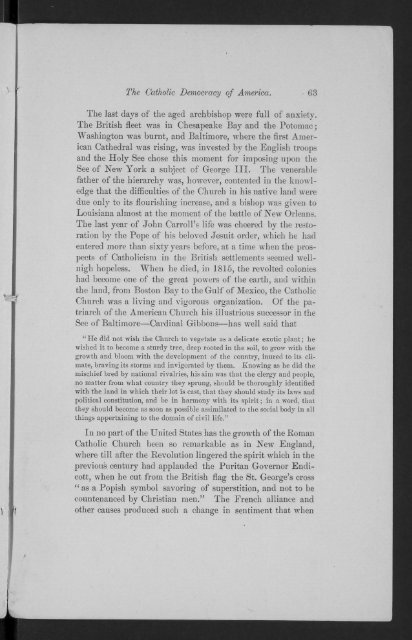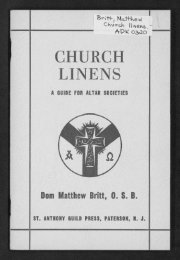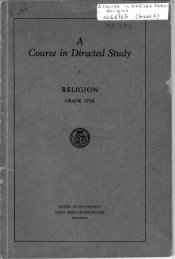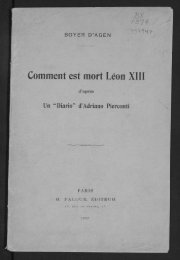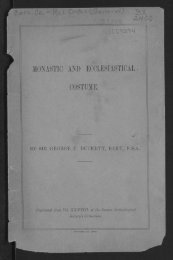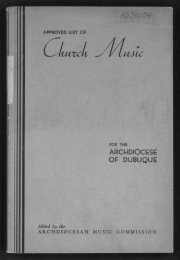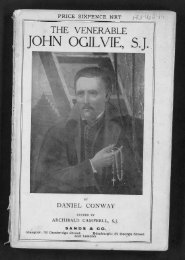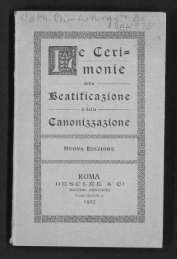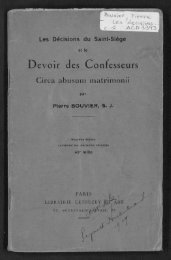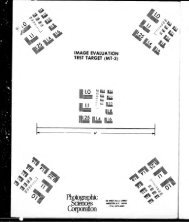r The Catholic Democracy of America,64 - Digital Repository Services
r The Catholic Democracy of America,64 - Digital Repository Services
r The Catholic Democracy of America,64 - Digital Repository Services
You also want an ePaper? Increase the reach of your titles
YUMPU automatically turns print PDFs into web optimized ePapers that Google loves.
<strong>The</strong> <strong>Catholic</strong> <strong>Democracy</strong> <strong>of</strong> <strong>America</strong>, 63<br />
<strong>The</strong> last days <strong>of</strong> the aged archbishop were full <strong>of</strong> anxiety.<br />
<strong>The</strong> British fleet was in Chesapeake Bay and the Potomac j<br />
Washington was burnt, and Baltimore, where the first <strong>America</strong>n<br />
Cathedral was rising, was invested by the English troops<br />
and the Holy See chose this moment for imposing upon the<br />
See <strong>of</strong> New York a subject <strong>of</strong> George III. <strong>The</strong> venerable<br />
father <strong>of</strong> the hierarchy was, however, contented in the knowledge<br />
that the difficulties <strong>of</strong> the Church in his native land were<br />
due only to its flourishing increase, and a bishop was given to<br />
Louisiana almost at the moment <strong>of</strong> the battle <strong>of</strong> New Orleans.<br />
<strong>The</strong> last year <strong>of</strong> John Carroll's life was cheered by the restoration<br />
by the Pope <strong>of</strong> his beloved Jesuit order, which he had<br />
entered more than sixty years before, at a time when the prospects<br />
<strong>of</strong> <strong>Catholic</strong>ism in the British settlements seemed wellnigh<br />
hopeless. When be died, in 1815, the revolted colonies<br />
had become one <strong>of</strong> the great powers <strong>of</strong> the earth, and within<br />
the land, from Boston Bay to the Gulf <strong>of</strong> Mexico, the <strong>Catholic</strong><br />
Church was a living and vigorous organization. Of the patriarch<br />
<strong>of</strong> the <strong>America</strong>n Church his illustrious successor in the<br />
See <strong>of</strong> Baltimore—Cardinal Gibbons—has well said that<br />
" He did not wish the Church to vegetate as a delicate exotic plant; he<br />
wished it to become a sturdy tree, deep rooted in the soil, to grow with the<br />
growth and bloom with the development <strong>of</strong> the country, inured to its climate,<br />
braving its storms and invigorated by them. Knowing as he did the<br />
mischief bred by national rivalries, his aim was that the clergy and people,<br />
no matter from what country they sprung, should be thoroughly identified<br />
with the land in which their lot is cast, that they should study its laws and<br />
political constitution, and be in harmony with its spirit; in a word, that<br />
they should become as soon as possible assimilated to the social body in all<br />
things appertaining to the domain <strong>of</strong> civil life."<br />
In no part <strong>of</strong> the United States has the growth <strong>of</strong> the Roman<br />
<strong>Catholic</strong> Church been so remarkable as in New England,<br />
where till after the Revolution lingered the spirit which in the<br />
previous century had applauded the Puritan Governor Endicott,<br />
when he cut from the British flag the St. George's cross<br />
" as a Popish symbol savoring <strong>of</strong> superstition, and not to be<br />
countenanced by Christian men." <strong>The</strong> French alliance and<br />
other causes produced such a change in sentiment that when


